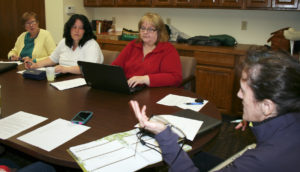By Barb Arland-Fye
The Catholic Messenger
DES MOINES —Governor Terry Branstad has signed a bill on human trafficking, the impetus of which came from volunteers and legislators in the Davenport Diocese.
The new law enhances penalties against people engaged in human trafficking, creates a fund for victims and allows county attorneys to refer a juvenile forced into prostitution to the Department of Human Services as a child in need of assistance.

Diocesan volunteer Nora Dvorak and the ecumenical group she helped found, Attacking Trafficking, contacted State Sen. Rita Hart late last year with concerns about human trafficking. Together, they worked with Hart, a Democrat from Wheatland, on the bill that eventually passed.
“I am so pleased that we ended up with a bill that passed the Senate, House and now has been signed by the Governor,” Hart told The Catholic Messenger. “This is a good start for legislation on human trafficking. We need to continue to work together to improve our educational efforts on this issue and we have a long ways to go in making sure that we have the services to provide for human trafficking victims once they are identified.”
Hart noted that “Tackling human trafficking issues is not easy, especially as not all the interested parties agree on how to do that. Everyone, however, agreed that something needed to be done as soon as possible to protect children — the most vulnerable human trafficking victims. Law enforcement shared with us examples of rescuing young girls who were being trafficked for sex. This underscored an urgent need to recognize and take action regarding minors who are being trafficked in Iowa,” the legislator said.
She stressed that “children who are arrested for prostitution can and should be considered children in need of assistance rather than charged criminally as prostitutes. This bill insures that this will be an option for county attorneys, allowing the Department of Human Services to provide help and services to these victims.”
Lawmakers have no idea how many children are trafficked as prostitutes in Iowa. Hart said it is possible that much of this activity has not been identified. Dvorak and her fellow Attacking Trafficking advocates agree.
The group formed two years ago to provide education, awareness and context to the global problem of human trafficking; to build community coalitions to stop enslavement of children and adults; to care for victims and to prevent victimization. The Davenport Diocese and the Episcopal Diocese of Iowa have been very supportive of the group’s efforts.
Dvorak and Attacking Trafficking members Ann Mohr of St. Ann Parish in Long Grove and Walter Conlin of Ss. Mary & Mathias Parish in Muscatine met with Hart and State Sen. Joe Seng of Davenport to propose ways to improve existing state law.
Dvorak researched other states deemed to have good human trafficking laws and Conlin, a lawyer and former Iowa legislator, helped draft language for parts of Iowa’s new law.
“Rita took the time to hear our concerns and moved forward with that,” Dvorak said.
Persons who traffic children for prostitution will be severely penalized under the new law. An additional fine of $1,000 will be assessed against traffickers, johns and pimps who engage in child sex trafficking. That money will go into a fund to be used for services for victims of human trafficking as well as public awareness and law enforcement training relating to human trafficking, Hart added.
Currently the penalty for any “john” is an aggravated misdemeanor. This law will make the offer to purchase or the purchasing of services of a prostitute younger than 18 years old a class “D” felony, Hart said.
Tom Chapman, executive director of the Iowa Catholic Conference, believes legislators came together to do the right thing. In his weekly newsletter he noted that “Human trafficking is a crime against the fundamental rights and dignity of the human person.”
He noted that the U.S. House of Representatives will soon begin work on a bill (H.R. 3344) that intends to reduce the vulnerability of temporary workers in the U.S. to labor trafficking. Catholic Relief Services and The U.S. Conference of Catholic Bishops support this legislation.








